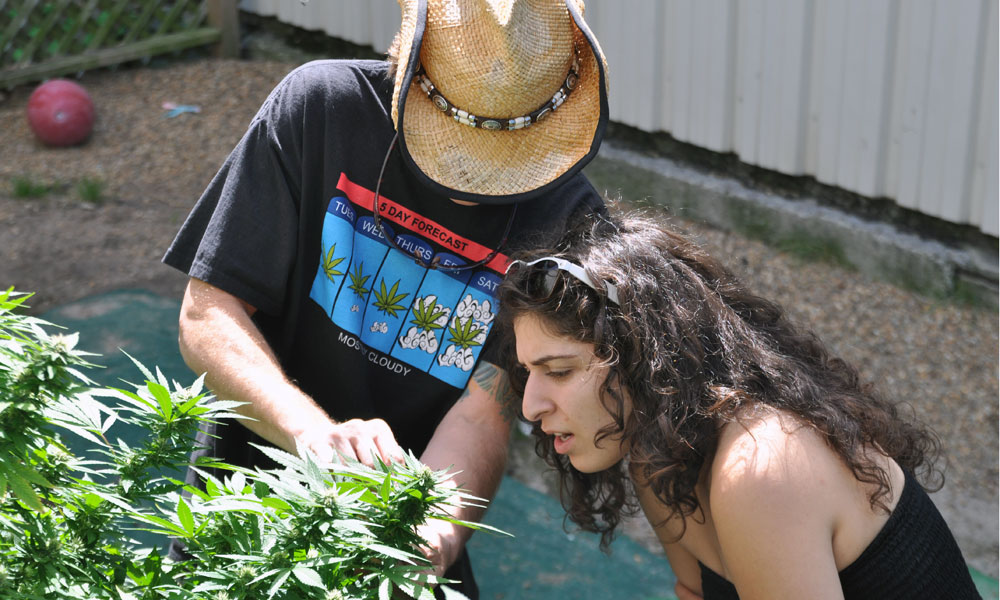
In 2010, while states across the nation wrestled with possible legislation to legalize marijuana, Alyson Martin and Nushin Rashidian graduated from Columbia Graduate School of Journalism and decided to tie their future to covering cannabis by criss-crossing the country in a red Volkswagon to document the historic efforts.
One year, a lot of reporting and 13 states later, their enriched understanding of the public’s changing personal and political perspectives led to a grant for an interactive game, a website focused on the trendy topic and plentiful material for a book.
In 2014 they produced a book titled “A New Leaf: The End of the Cannabis Prohibition.” Now with that behind them, sometime this year Martin, 29, and Rashidian, 27, plan to relaunch their website into a broader portal covering the economic, criminal and health facets of cannabis and efforts to legalize it. Their Cannabis Wire portal seeks contributors nationwide.
Rashidian spoke with American Journalism Review on this emerging industry and how she thinks journalists should cover it. Below are short excerpts of her remarks, lightly edited and reorganized for clarity.
WHAT NEEDS TO BE COVERED
“What Alyson and I want to do is really guide the national conversation using our six or so years of expertise. … Some of the humor around cannabis needs to go away. … There’s a real problem with inconsistent terminology alone. A lot of people use decriminalization and legalization interchangeably. That’s not how we, as a country view legalization. When we say ‘legalize,’ we think legalize and regulate. Reporting needs to go a level deeper. We need to get more into how to legalize, what are the options for tax structures, options for where tax revenues go.”
CANNABIS AS A BEAT
“We want to get away from this idea that cannabis is a beat unto itself. We really try to drive home that it’s an intersection of [ a lot of topics like] health, technology – [like] how technology is changing the way cannabis is grown, processed, consumed.
“This isn’t just about being a cannabis enthusiast; it’s an issue that affects all of these issues we talk about as a country. … As this issue becomes more mainstream, naturally there’ll be a need to pay more attention to it.”
RIDING A SOCIO-POLITICAL WAVE
“Our timing was unique in that we saw the very beginning of the maturation of the industry. We met [a lot of] mom-and-pop business people [who now] operate multimillion-dollar companies. Watching everything unfold very literally before our eyes leads to a certain level of understanding that you can’t replicate. We immersed ourselves in each state. We got to know its culture and the people, from the libertarian heartbeat of Maine to the liberal environment of Vermont.
“I’m a big fan of getting feet on the ground. Were not going to have a bunch of [reporters] sitting in New York calling sources; we want people [writing for us from] around the country. If you don’t know the local culture and [those] involved, your story will only go an inch deep.”
ON THEIR TARGET AUDIENCE
“My hope … is to get the people who wouldn’t ordinarily read about cannabis. It’s all but guaranteed that this movement, if it’s not already in their state, is going to get there. The more they know, the more of a role they can play in determining what that looks like. It’s about engaging as many people as you can with this conversation. That’s not going to be accomplished through treating this as a beat, but as something that [blends] topics people care about.”
THE REBIRTH OF CANNABIS WIRE
“As soon as we got off the road, we received a grant through the Brown Institute for Media Innovation. Because the grant is innovation-driven, we focused on one innovative project and created an interactive news game that challenges players to grow cannabis while not harming the environment. Once we finished that, and we went head first into building the business plan for the news site and how to fund this now.”
CANNABIS WIRE’S APPROACH
“It’s going to be like [other] news organizations today – whatever format that best fits the story because we have so many tools available to us these days. News organizations should be asking, ‘Is this best visualized? Is it best as an 800-word story? Is this best as a video?’ That’s how we’re going to move forward – anything from long form to a quiz, whatever we think is going to meet our needs.”









